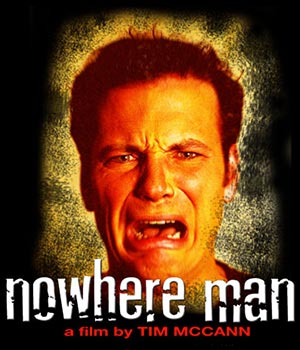 In The Maltese Falcon, Sam Spade called the title statuette everyone was trying to grab “the dingus.” As if Freudians needed another clue as to what the hardboiled detective was trying to win back from femme fatale Bridget Shaugnessy and prevent from falling into the hands of the obviously homosexual cabal of Gutman, Cairo, and Wilmer.
In The Maltese Falcon, Sam Spade called the title statuette everyone was trying to grab “the dingus.” As if Freudians needed another clue as to what the hardboiled detective was trying to win back from femme fatale Bridget Shaugnessy and prevent from falling into the hands of the obviously homosexual cabal of Gutman, Cairo, and Wilmer.
Making such a sub(?)text into the upfront plot of a movie might sound a bit too bold, even self-defeating. But we live in a post-Bobbit world and, on the evidence of his movie, Nowhere Man, writer-director Tim McCann turns out to have the wit, filmmaking skill, and sheer effrontery necessary to take up such a dare successfully.
The nowhere fellow of the title is Conrad Kane (a capable Michael Rodrick), a Long Islander who, we learns quickly enough, has had his penis cut off. Setting up a parallel story-telling structure, McCann tells us Conrad’s tale of woe in two tracks. The first – the “now,” if you will, of the story – concerns his determined, increasingly violent efforts to track down his former girlfriend, Jennifer (scream queen Debbie Rochon, also good), who not only cut off his member, but has absconded with it.
The second tracks the end of his halcyon days with Jennifer, when a budding engagement turns sour after Conrad receives a tape from an anonymous sender. It turns out to be a porn flick Jennifer appeared in several years before she met Conrad, a discovery our young hero greets with a full measure of anger and disgust. Whatever high ground he occupies relative to Jennifer (who kept this part of her life hidden) soon gives way under the weight of his abusive response, which finally sets a repentant Jennifer on the road to vengeance.
Ha-ha, you say. In fact, the movie is quite funny at times. The emergency room doctor (played by Troma Films boss Lloyd Kaufman) who treats Conrad’s affliction takes an excessively detached view of the situation, first using a chart to outline the details of what’s gone and what’s left, then advising his patient to avoid depression by taking a wider perspective of the alternate riches of life.
More wittily, Conrad’s pursuit of Jennifer and his penis takes him into the world of porno, into which Jennifer has disappeared. Conrad has figured out that his ex is hiding out with Daddy Mac (Frank Olivier), the porno star who was Jennifer’s main acting partner. To find him, Conrad has to pass through the explicitly, sexually exaggerated world of pornography and quasi-criminality. McCann even has the nerve to toss white men’s purported sexual jealousy of black men: Daddy Mac and a couple of his associates are African-American.
McCann’s half-serious, half satirical take on tough-guy action films (reminiscent of Robert Aldrich’s Kiss Me Deadly) is shot in a highly effective, if counter-intuitive style. Nearly every filmmaker who picks up a video camera serves the technology by emphasizing long takes and gliding camera movements. McCann takes a completely opposite tack, emphasizing as many camera set-ups as he can cram into a single scene and then cutting them together in a superior display of editing. In fact, Nowhere Man may be the best edited film in I-don’t-know-how-long. The result isn’t an empty-headed virtuosity, but a film that, in scene after scene, elucidates and elaborates on the emotional state of its characters.
This is in addition to the more over-arching editing venture, in which Conrad’s “present-day” search for Jennifer alternates with flashbacks of the flowering and deterioration of the pair’s romance. Aside from building to simultaneous climaxes, the two parallel sequences also seduce us into splitting our sympathies between Conrad and Jennifer.
McCann is what you might call a natural, or intuitive filmmaker. That doesn’t mean he doesn’t work at what he does; obviously the editing required intensive labor. But you can’t entirely teach visual composition nor an understanding of camera placement that results in a single character in a single scene being shot from a variety of distances. What exactly he’s doing at this financially borderline level of filmmaking is a bit mysterious to me. There’s a hint that (like the great Edgar G. Ulmer) he prefers it there, since its at the margins of filmmaking that a writer-director can do skilled, nervy work. Whatever the reason, with Nowhere Man he’s come up with an impressive piece of work.
